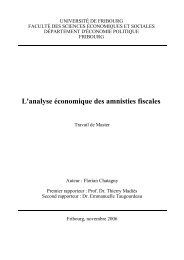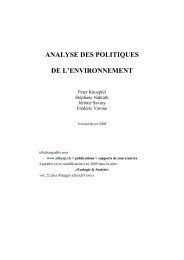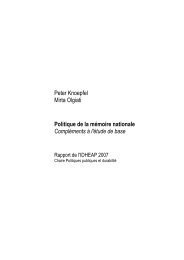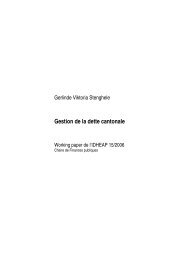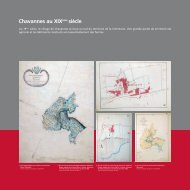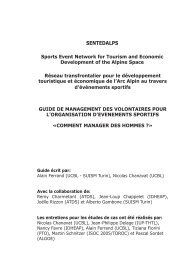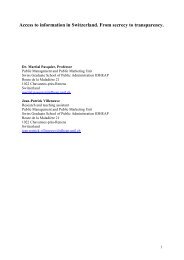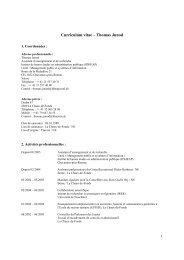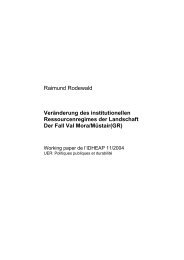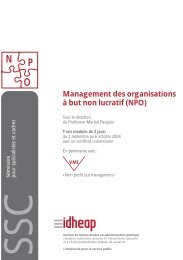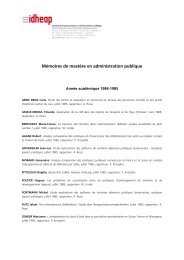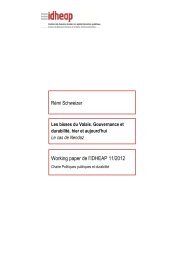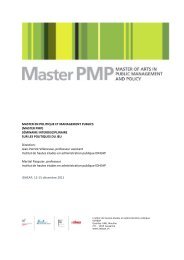Voting advice applications and party choice: evidence from ...
Voting advice applications and party choice: evidence from ...
Voting advice applications and party choice: evidence from ...
You also want an ePaper? Increase the reach of your titles
YUMPU automatically turns print PDFs into web optimized ePapers that Google loves.
376 A. Ladner, J. Fivaz <strong>and</strong> J. Pianzola<br />
should vote for are more amenable toward the services provided by VAAs. The<br />
following table presents the bivariate association between those voters who reported that<br />
the tool had influenced their vote <strong>choice</strong>s <strong>and</strong> swing-voting.<br />
Table 4<br />
Swing voters influenced by smartvote in their voting decisions<br />
Reported to be influenced by smartvote in their votes <strong>choice</strong>s<br />
Yes (%) No (%) N(=100%)<br />
Swing voters<br />
Yes 73 27 4426<br />
No 56 44 7082<br />
Total 63 37 11,508<br />
Source: NCCR “Democracy”, IP16 “smart-voting 2.0” (http://www.nccr-democracy.<br />
uzh.ch/research/module5/smart-voting/smart-voting).<br />
As expected, those who stated that they were influenced by the voting recommendations<br />
in their vote <strong>choice</strong>s are also more likely to swing-vote (73% vs. 56%). In the next step,<br />
we will assess whether being influenced by the smartvote voting recommendations holds<br />
as a significant predictor for vote change if we control for relevant covariates. Through a<br />
logistic regression, we ascertain the probability of vote change based on the influence<br />
that smartvote had on users. The aim is to determine whether the previous illustrated<br />
differences can be maintained if we take other relevant factors into account. It has to be<br />
stressed beforeh<strong>and</strong> that any findings hold only for the sample at h<strong>and</strong>.<br />
The dependent variable in our logistic regression is vote change between elections.<br />
The dichotomised variable takes on the value of 1 if respondents changed their vote<br />
<strong>choice</strong>s in comparison to the previous elections <strong>and</strong> 0 if they did not change their vote<br />
<strong>choice</strong>s. The variable “influenced by voting recommendations” is also binary <strong>and</strong><br />
indicates whether voters reported that smartvote affected their vote <strong>choice</strong>s. We also<br />
assess how much the nature of the voting recommendations influences the probability of<br />
swing-voting. We asked participants whether the voting recommendations they received<br />
met their expectations or whether they were surprised by the results they got. The<br />
reception of the voting recommendations was measured on a 4-point scale; thus, three<br />
dummies <strong>and</strong> their respective reference categories are used as covariates in the model.<br />
We expect that, on average, the likelihood of swing-voting increases with the surprise of<br />
a voter about the voting recommendations. The reasoning behind this is as follows: if a<br />
voter is surprised by the voting recommendations, the recommended parties/c<strong>and</strong>idates<br />
most likely differ <strong>from</strong> that of voters’ initial <strong>party</strong> preferences (otherwise, she would not<br />
be surprised). If the voter is convinced by the voting recommendations, she might adapt<br />
her initial <strong>choice</strong>s <strong>and</strong> vote in accordance with the voting recommendations (swingvoting<br />
if this occurs on the <strong>party</strong> level). At the same time, surprising voting<br />
recommendations might also cause the opposite reaction in that the voter dismisses it<br />
altogether. In any case, a voter who receives voting recommendations that meets her<br />
expectations is most likely simply strengthened in going along with her initial <strong>party</strong><br />
<strong>choice</strong>s (thus yielding no swing-voting). On average, therefore, we expect that surprising<br />
voting recommendations is more likely to trigger swing-voting than expected results in<br />
the voting recommendations.



